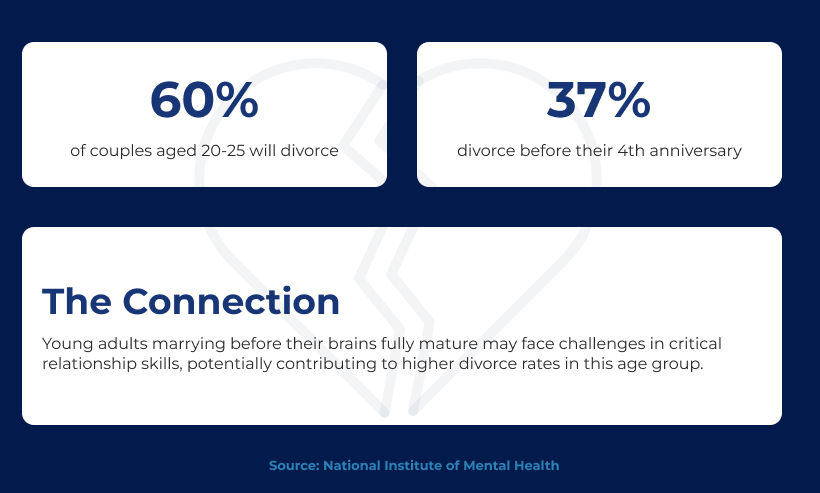Why Is Divorce in the Early 20s So Challenging? Everything You Should Know
 Getting married in your twenties may seem romantic and exciting. You have dreams of traveling together, maybe moving to another city to start fresh as your relationship blossoms. The possibilities seem endless. But then reality hits you head-on, and the rose-colored glasses disappear. Entry-level jobs and student loan debt put a heavy burden on your finances. More than two-thirds of marriages are ended partially or entirely due to financial troubles.
Getting married in your twenties may seem romantic and exciting. You have dreams of traveling together, maybe moving to another city to start fresh as your relationship blossoms. The possibilities seem endless. But then reality hits you head-on, and the rose-colored glasses disappear. Entry-level jobs and student loan debt put a heavy burden on your finances. More than two-thirds of marriages are ended partially or entirely due to financial troubles.
According to the National Institute of Mental Health, the human brain generally does not fully mature until around 25 years of age. However, some areas, such as the prefrontal cortex, which is responsible for reasoning and decision-making, may continue to develop and mature into the mid-to-late 20s. This translates into a lack of emotional maturity, as well as poor communication and decision-making skills in some cases. Statistics indicate that 60% of couples between the ages of 20-25 will divorce, and of those, 37% will divorce before their 4th anniversary.
Increasing rent, grocery prices, and university tuition fees put an enormous financial strain on young couples, even more so for young families with children. When both parents work, the cost of childcare can significantly impact the family budget, leading to increased stress on the marriage.
The Bronzino Law Firm understands how overwhelming divorce can be—especially when you’re in your early 20s and still trying to build your future. The firm offers clear, compassionate legal guidance tailored to your specific situation. Whether you are concerned about financial issues, housing, alimony, child custody, or questions about your rights, the Bronzino Law Firm is here to help you navigate the divorce process with confidence.
There are several aspects to consider when contemplating a marital split in your 20s: financial issues, your career, emotional support, and how friends or family will react. It is vital to familiarize yourself with the legal, financial, and emotional aspects of a divorce in your 20’s.
Understanding the legal landscape of divorce in NJ
The divorce process begins when one spouse, known as the plaintiff, files a Complaint for Divorce with the Superior Court. The other spouse, known as the defendant, must be formally served with the demand for divorce. New Jersey allows for “no-fault” and “fault” divorces. Many couples choose a “no-fault” divorce, citing irreconcilable differences as opposed to a fault divorce for reasons such as emotional cruelty or infidelity. A couple is eligible to file for a no-fault divorce when one or both spouses have resided in New Jersey for at least a year, and there has been a separation of six months or more. For young adults in their early 20s, a no-fault divorce is typically the least contentious and most straightforward path forward.
There are several ways to complete a divorce agreement. If there was a prenup, the division of assets and possibility of spousal support will most likely already be decided. Because younger couples typically have fewer assets, mediation can often resolve any issues. When neither of those processes work, the spouses go to court. New Jersey is an equitable distribution state, which means the assets and debts are divided fairly, not necessarily 50/50. Typically, assets owned individually before the marriage are not considered marital property. In the same vein, debts acquired before the marriage will most likely become the sole responsibility of the original debtor.
6 Major Obstacles You’ll Face with Divorce Early 20s
- Limited assets and income
- Student loan debt
- Difficulty establishing financial independence post-divorce
- Emotional impact
- Career and Education
- Social and family dynamics
Limited assets and income
Couples in their early 20s are just starting. They rarely own a home and have little savings, investments, or passive income streams. Many are at the lower end of the job ladder, some years away from higher, better-paying positions. This does not mean the financial split is simple. Breaking a lease, covering moving expenses, paying one’s own rent, and incurring attorney’s fees on a limited income can seem insurmountable. Many young adults forego hiring a divorce attorney to save money, but doing so can lead to costly mistakes.
Student loan debt
In divorce proceedings, student loan debt incurred before marriage is generally considered separate property, meaning the borrower is typically responsible for repayment. However, student loans taken out during the marriage can be regarded as marital property and may be subject to division. The specific division depends on individual circumstances. If a loan was co-signed or if funds were used during the marriage to pay one person’s tuition, disputes can arise over who should carry the burden moving forward. The New Jersey courts typically consider the length of the marriage and when the loans originated when deciding on the fiscal responsibilities related to this type of debt.
Difficulty establishing financial independence post-divorce
Many young couples live together prior to getting married. They rely on one another’s income to survive financially. They share a residence and everything that comes with it, including appliances, furniture, and vehicles. A divorce can drastically affect their budget and ability to live independently. They may have to move back home with their parents or seek a roommate to help them stay financially afloat.
Emotional impact
No one gets married expecting an imminent divorce, and when it happens in your 20s, it can feel as if you have failed before you have even gotten started. You may question your judgment and ability to make life-altering decisions. Emotional immaturity can complicate communication and decision-making during the divorce, leading to hurtful exchanges or stalled progress. Without the benefit of experience, it’s easy to react out of fear or pain rather than maturity and logic.
Career and Education
Divorcing in your 20s can disrupt the momentum of early adulthood. Whether you are a university student, a career-focused professional, or both, a divorce can quickly put the brakes on your plans. Maybe you need to go back to work full-time and put your studies on hold or have to forego that promotion because you don’t want to delay your graduation. Balancing court dates with other responsibilities and managing the financial upheaval while juggling school, work, and other commitments can be exhausting.
Social and family dynamics
Divorce at a young age can isolate you in unexpected ways. Friends may not know what to say—or may pull away altogether. They may not want to pick sides, especially if their friendship began after you and your spouse were a couple.
Divorcing in your 20s can be a lonely process. Your single friends may encourage you to “get over it.” In contrast, your married friends may express disappointment at your decision to end your union. Your family can also complicate matters. If they were particularly fond of your spouse, the separation can be tough on them as well. Other relatives may judge you or express their disappointment, which is about as helpful as a screen door on a submarine. Your best bet is to establish solid boundaries and steer clear of any negative influences.
Practical Steps to Navigate Divorce Early 20s
Consult with an Attorney:
Even if the split seems amicable or uncomplicated, having legal guidance ensures that your rights are protected and that you fully understand what you’re agreeing to. The Bronzino Law Firm has years of experience in divorce cases for young adults in New Jersey. They know the financial, emotional, and legal challenges that come with divorce at a young age. Starting with the proper legal support can make a seemingly impossible situation more manageable.
Gather documents
Your attorney can make a list of important documents you will need to acquire to facilitate the divorce process. Some of these include bank statements, credit card statements, a lease agreement, other loan documents, shared bills, and pay stubs. Having a clear financial picture before your divorce will smooth out the process. Even if there are few assets, your attorney can better serve you by having a financial picture beforehand.
Create a support system
Let go of anyone who isn’t willing to offer their friendship and support. Lean on friends and family who listen and support you without judgment. Avoid isolation and consider joining a support group in person or online. Knowing that you are not alone in going through a divorce can make a significant difference. Create a small circle of “ride or die” folks you can count on to give you advice, listen as you vent, or cheer your accomplishments as you move on with your life.
Prioritize self-care
Your mental and physical health can take a serious hit during a divorce. Prioritizing self-care isn’t just about bubble baths, journaling, and meditation. Those things can be helpful, but there are other important tools, such as getting enough sleep, eating nutritious food regularly, and taking breaks from stress when possible. Therapy can be beneficial and help you set boundaries around people who make things worse. Taking care of yourself isn’t selfish; it contributes to your ability to move past a hurtful or stressful time in your life.
Stay away from social media
Posting on social media when emotions are high is tempting. You want the world to know how hurt and frustrated you are. Oversharing can complicate legal matters, damaging your credibility. Avoid checking on your ex. Catfishing (creating a fake profile) if you have been blocked or relying on mutual friends to keep you abreast of your ex’s life without you is unhealthy and unproductive. Don’t complicate matters by adding social media drama.
Life After Divorce Early 20s: Long-Term Considerations
Rebuilding financially

Dating after divorce
After a divorce in your 20s, you still feel young but also more mature after having gone through a divorce. It has changed you and how you view relationships, both positively and negatively. Boundaries, communication, and self-awareness often become sharper after going through a breakup of this magnitude. Building a friendship may feel safer than hurriedly diving into a romantic relationship. You may find that you have trust issues that need to be addressed before you get into anything serious.
Moving forward and setting goals
One of the most liberating parts of coming out of a divorce in your early 20s is the chance to redefine what you want your life to look like. The sky is the limit. You can go back to school, relocate, change careers, or simply learn how to enjoy your own company. Your path doesn’t have to make sense to anyone else. You have been through a storm, and it reshaped you in ways that will influence your future. You can take your time as you explore changes and build relationships that allow you to thrive.
Trusted Legal Guidance Through Your Divorce Early 20s – Bronzino Law Firm
Getting a divorce at any age is stressful, painful, and exhausting. Divorcing in your 20s, when you are probably unfamiliar with the legal system, can leave you petrified. The Bronzino Law Firm doesn’t just handle the paperwork. We will protect your rights and guide you through the divorce process to make the best decisions for your future. We will break everything down in clear terms to help you avoid costly legal mistakes. You are not alone. Let us help you to move forward to a new chapter in your life. With convenient offices in Brick and Sea Girt, NJ, we serve Ocean and Monmouth County residents facing divorce early 20s. Call (732) 812-3102 or contact us online for your complimentary consultation.








